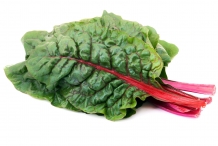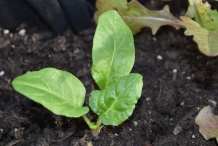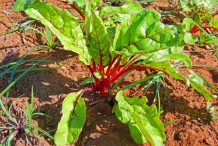It is a biennial plant, usually grown as an annual, which grows upto 1 – 3 feet (506 mm) tall. Swiss chard is a cool season crop which thrives in well- drained soil. The leaves are broad, wavy, wrinkled which sizes about 37 cm long and 25 cm wide. The dark green leaves are glossy and crisp. The stems are colorful mainly white, orange, purple and ivory with pink stripes. The plant of Swiss chard has deep root system which is hard and woody. The bright red stalk reaches from 10 – 12 inches high. The plant contains 2 to 8 fine seeds.
Depending upon the variety and time of the year, Swiss chard lives upto two years. Swiss chard is also known by these names such as Swiss chard, perpetual spinach, silverbeet, crab beet, spinach beet, seakale beet, bright lights, and mangold. The varieties of Swiss chard are: Bright Lights, Bright Yellow, Fordhook Giant, Lucullus, Rhubarb Chard, Rhubarb Red and Ruby.
History
Since 300 B.C. Swiss chard was cultivated and the roots of wild chard were used for medicinal purpose. The wild form is found in the Canary Islands, east to southern Asia and Mediterranean region. According to the records, Swiss chard was cultivated in the Mediterranean area, Italy being the center of origin.
Nutritional Value
In 48.0 gram serving, Swiss chard (raw) provides 9 calories and possesses good amounts of vitamins B6 with 3.69% of DV. It is low in protein, carbohydrates, dietary fiber and fat.
175 gram of cooked Swiss chard without salt provides 11.54% of Vitamin B2, 11.46% of Vitamin B6, 5.70% of Vitamin B5, 35.71% of magnesium, 25.39% of manganese, 20.45% of potassium and 49.38% of iron.
One cup of chopped Swiss chard, cooked with salt (about 175 grams) contains 35 calories, 0.14 grams of fat, 3.29 grams of protein, 3.7 grams of fiber, 7.23 grams of carbohydrate and 1.93 grams of sugar.
Health Benefits of Swiss chard
Swiss chard possesses an impressive amount of phytonutrients which are the source of anti-inflammatory, antioxidant properties. It contains low amount of calories which makes it a great dietary food. It is a good source of Vitamin K, C, A, potassium, magnesium, dietary fiber and iron. The antioxidants such as carotenoid, betalain and polyphenol antioxidants prevent the free radical damage, diseases and inflammation.
- Prevent diabetes
Swiss chard helps to maintain the level of blood sugar in the body. Syringic acid inhibits the activity of alpha-glucosidase. This helps to break down the fewer cards into simple sugars that allow the level of blood sugar level to remain stable. This prevents the peaks and plunges which is harmful for the diabetic patients. (1)
- Prevent cancer
Swiss chard possesses anti-cancer properties. It possess high amount of antioxidants that eliminates free radicals. Free radicals are the harmful byproducts of cellular metabolism that leads the healthy cells to cancerous. Swiss chard possesses an adequate amount of Vitamin C, E, lutein, kaempferol, zeaxanthin, quercetin and beta-carotene which helps to prevent colon cancer. (2)
- Healthy bones
The leaves of Swiss chard contain an adequate amount of calcium which is essential for the good health of bones. Minerals such as Vitamin K, Magnesium and Calcium help to promote the growth and development of bones.
- Enhance brain
Swiss chard provides a good source of Vitamin K and potassium which is found in brain in significant. It helps to enhance the cognitive abilities and development. The addition of Swiss chard to the diet helps to promote the brain function.
- Circulation of blood
Iron and copper deficiency results in anemia due to which one experience the symptoms such as fatigue, weakness, lack of concentration and stomach disorders. The consumption of Swiss chard helps to enhance the circulation of blood and oxygenation of organs in the body. (3)
- Maintains blood pressure
Swiss chard contains the phytonutrient, anti-inflammatory antioxidants along with potassium which helps to lower the blood pressure due to which it also lessens the stress on cardiovascular system. The consumption of Swiss chard helps to prevent the heart ailments such as heart attacks, atherosclerosis and strokes.
- Vision health
Huge amount of beta-carotene in Swiss chard helps to promote the health of eyes and lowers the chances of glaucoma, macular degeneration, night blindness and other eye ailments. (4)
- Healthy hair
The presence of Biotin which is an organic compound helps to stimulate the hair follicles and also increases the texture and luster of hair. Swiss chard possesses biotin in significant amounts. (5)
How to Eat
- The young Swiss chard is used as salads and the mature ones are cooked or sautéed.
- It can be added to salads, pizza, pastas, gratins, bruschetta, and soups.
- Leaves and stalks could be boiled, roasted or steamed.
Precautions
- The people having stones or kidney stones should avoid consumption of Swiss chard because it possesses oxalic acid which promotes the risk of oxalate stone.
- Due to the high Vitamin K in Swiss chard, it is not recommended for people in an anticoagulant therapy.
Swiss chard – Beta vulgaris subsp. vulagaris Facts
Swiss Chard is the member of the beet family which was cultivated for thousands of years in Europe. Due to its huge cultivation in Switzerland it was referred as a Swiss Chard. It is a perfect substitute for spinach. It possesses thicker leaves. Swiss chard is an excellent source of vitamin A, C, K, manganese and magnesium.
| Swiss chard Quick Facts | |
|---|---|
| Name: | Swiss chard |
| Scientific Name: | Beta vulgaris subsp. vulagaris |
| Origin | Mediterranean region |
| Colors | Dark green |
| Shapes | Broad, wavy, wrinkled; Length: 37 cm; Width: 25 cm |
| Taste | Bitter, pungent and mild salty |
| Calories | 9 Kcal./cup |
| Major nutrients | Vitamin K (332.00%) Vitamin A (21.00%) Vitamin C (16.00%) Iron (10.75%) Copper (9.56%) |
| Health benefits | Prevent diabetes, Prevent cancer, Healthy bones, Enhance brain, Vision health |
| Name | Swiss chard |
|---|---|
| Scientific Name | Beta vulgaris subsp. vulagaris |
| Native | Mediterranean region |
| Common/English Name | Swiss chard, perpetual spinach, silverbeet, crab beet, spinach beet, seakale beet, bright lights and mangold |
| Name in Other Languages | Spanish: Acelgas Hindi: Cahuli Saag Tamil: Sencheerai French: Blettes |
| Plant Growth Habit | Biennial or annual |
| Growing Climate | Cool season |
| Soil | Well- drained |
| Plant Size | 1 – 3 feet (506 mm) |
| Lifespan | Two years |
| Plant weight | 346 g |
| Stem | White, orange, purple and ivory with pink stripes |
| Plant Season | Spring, Summer, Fall, Winter |
| Root | Deep root system, hard and woody |
| Stalk size | 10 – 12 inches high |
| Stalk color | Bright red |
| Leaf shape & size | Broad, wavy, wrinkled; Length: 37 cm; Width: 25 cm |
| Leaf texture | Glossy, crisp |
| Leaf color | Dark green |
| Flavor/aroma | Earthy, slightly tangy |
| Fruit Taste | Bitter, pungent and mild salty |
| Seed | 2-8 fine seeds |
| Varieties/Types |
|
| Major Nutrition (Raw) | Vitamin K (phylloquinone) 398.4 µg (332.00%) Vitamin A, RAE 147 µg (21.00%) Vitamin C (Ascorbic acid) 14.4 mg (16.00%) Iron, Fe 0.86 mg (10.75%) Copper, Cu 0.086 mg (9.56%) Magnesium, Mg 39 mg (9.29%) Manganese, Mn 0.176 mg (7.65%) Sodium, Na 102 mg (6.80%) Vitamin E (alpha-tocopherol) 0.91 mg (6.07%) Isoleucine 0.071 g (4.25%) |
| Health Benefits |
|
| Calories per leaf (48.0 gm) Raw | 9 Kcal. |
| Traditional uses |
|
| Other Facts |
|
Comments
comments



